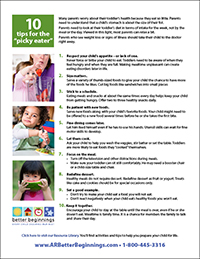Many parents worry about their toddler’s health because they eat so little. Parents need to understand that a child’s stomach is about the size of their fist. Parents need to look at their toddler’s diet in terms of intake for the week, not by the meal or the day. Viewed in this light, most parents can relax a bit. Parents who see weight loss or signs of illness should take their child to the doctor right away.
1. Respect your child’s appetite – or lack of one.
Never force or bribe your child to eat. Toddlers need to be aware of when they feel hungry and when they are full. Making mealtime unpleasant can create eating disorders later in life.
2. Size matters.
Serve a variety of thumb-sized foods to give your child the chance to have more of the foods he likes. Cut big foods like sandwiches into small pieces
3. Stick to a schedule.
Eating meals and snacks at about the same times every day helps keep your child from getting hungry. Offer two to three healthy snacks daily.
4. Be patient with new foods.
Serve new foods along with your child’s favorite foods. Your child might need to be offered to a new food several times before he or she takes the first bite.
5. Fine dining comes later.
Let him feed himself even if he has to use his hands. Utensil skills can wait for fine motor skills to develop.
6. Let them cook.
Ask your child to help you wash the veggies, stir batter or set the table. Toddlers are more likely to eat foods they “cooked” themselves.
7. Focus on the meal.
- Turn off the television and other distractions during meals.
- Make sure your toddler can sit still comfortably. He may need a booster chair or a child-size table and chair.
8. Redefine dessert.
Healthy meals do not require dessert. Redefine dessert as fruit or yogurt. Treats like cake and cookies should be for special occasions only.
9. Set a good example.
- Don’t try to make your child eat a food you will not eat.
- Don’t react negatively when your child eats healthy foods you won’t eat.
10. Keep it together.
Encourage your child to stay at the table until the meal is over, even if he or she doesn’t eat. Mealtime is family time. It is a chance for members the family to talk and share their day.

View/Download the PDF version here. (Right click and chose “Save Link As” to download)
Click here to visit our Family Resource Library. You’ll find activities and tips to help you prepare your child for







